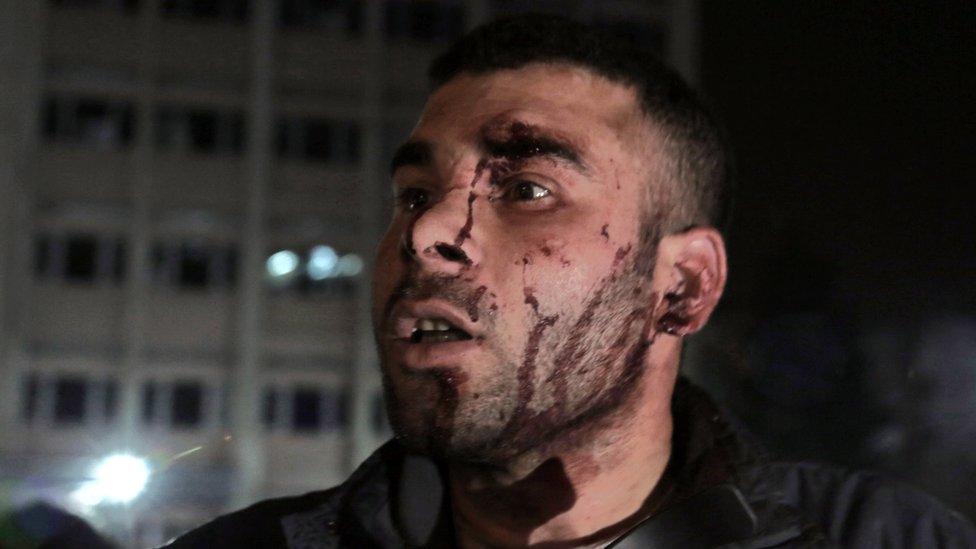IS conflict: Turkey-backed Syrian rebels take Jarablus
- Published
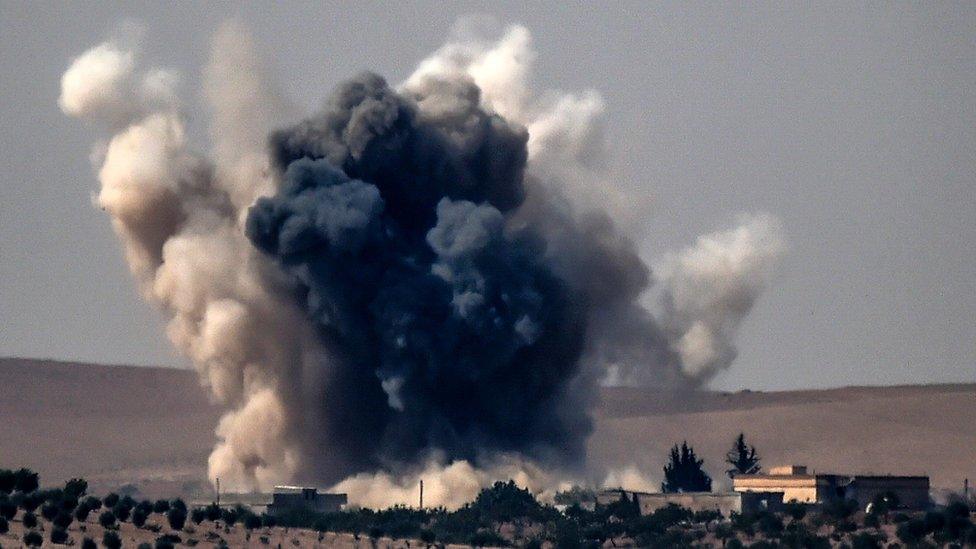
Smoke billows after an air strike on Jarablus
Syrian rebels, backed by the Turkish military and US air cover, say they have taken the town of Jarablus from jihadists of so-called Islamic State.
The assault began at dawn when Turkish warplanes, tanks and special forces personnel crossed the nearby border.
Rebel commanders said most of the IS militants subsequently retreated.
Turkey says its intervention is targeting both IS fighters and a Syrian Kurdish-led alliance that is attempting to advance on Jarablus.
President Recep Tayyip Erdogan later said the rebels had retaken the town "together with those who are from Jarablus", reported Reuters.
US Vice-President Joe Biden said the US had been flying air cover for the operation.
He also warned members of the Syrian Democratic Forces - the most effective opponents of IS on the ground in Syria - that they had to return to the east of the River Euphrates if they wanted to continue receiving its help.
"We have made it absolutely clear... that they must go back across the river," he said. "They cannot, will not, and under no circumstances get American support if they do not keep that commitment."
Making the highest-ranking visit to Ankara by a Western official since the failed Turkish coup on 15 July, Mr Biden also sought to dispel any doubts about America's solidarity with its Nato ally.

Looking for a reset: Barbara Plett Usher, BBC state department correspondent

Mr Biden (right) was given a tour of damage to the Turkish parliament during the coup
Joe Biden is in Turkey to try and reset relations strained by the fallout from last month's failed coup attempt. Turks felt they did not get a clear message of support from Washington so Mr Biden is doing everything he can to send one - including deliberate comparisons to the trauma Americans suffered after the 9/11 attacks.
The Turkish government is also upset by America's alliance with Kurds in northern Syria. It believes they are linked to Turkish Kurds who are battling Ankara. The US finds the Syrian Kurds an effective force against Islamic State militants but the Turks fear the alliance is helping them gain territory for an autonomous zone along the Turkish border.
A US official travelling with Mr Biden admitted that some Kurdish fighters had pushed further north than they should have and said Turkey's offensive on IS in Jarablus was probably partly to create a buffer zone against any further Kurdish advance.
But he said the US had "put a lid" on any more such moves, creating a breathing space for the Jarablus operation, which the US supports and to which it is ready to contribute.


President Erdogan earlier announced in a speech that the "operation against Daesh [IS] and PYD [Syrian Kurdish Democratic Union Party] terror groups" began at 04:00 (01:00 GMT) on Wednesday.
Operation Euphrates Shield was aimed at "putting an end" to problems on Turkey's border, he said.
Between nine and 12 tanks crossed the frontier, followed by pick-up trucks believed to be carrying hundreds of fighters from Turkish-backed factions of the rebel Free Syrian Army (FSA).
Within hours, several of the factions involved announced they had liberated Jarablus from IS fighters.
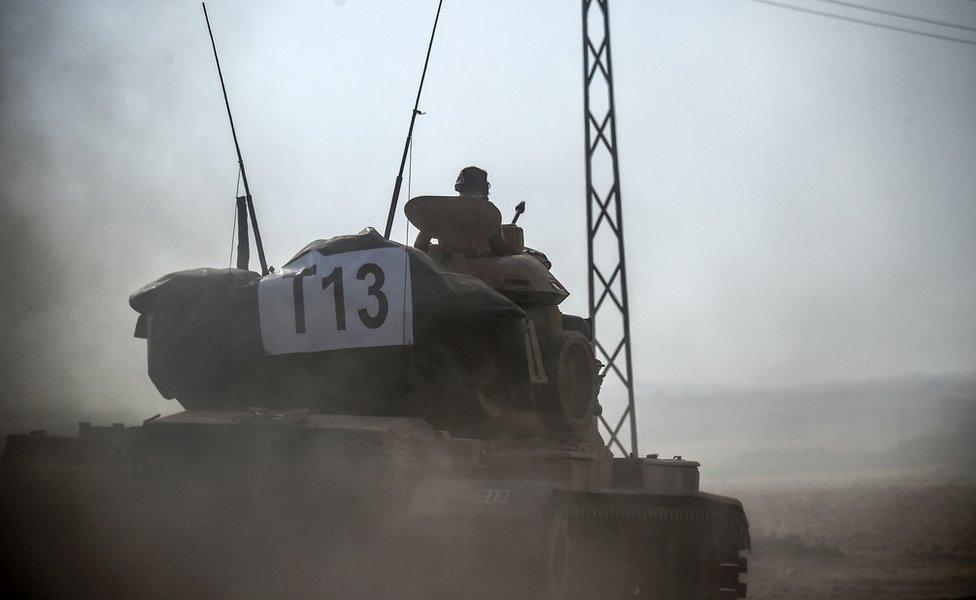
At least a dozen tanks were involved in what Turkey called Operation Euphrates Shield
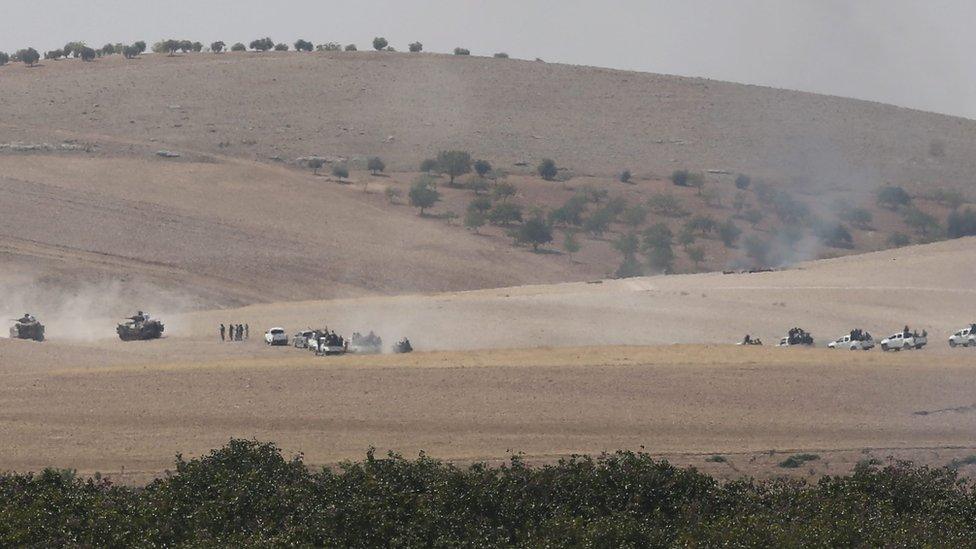
Fighters said to be from the Free Syrian Army followed the tanks in pick-up trucks
An opposition media activist embedded with the rebels, Ahmad al-Khatib, posted, external photos he said showed rebels inside central Jarablus, standing next to buildings painted with the black jihadist banner used by the self-styled IS.
The Syrian Observatory for Human Rights, a UK-based monitoring group, said that the rebels had almost fully taken Jarablus, noting that IS had now lost the last crossing on the Turkish border that it directly controlled.
Turkey has vowed to "completely cleanse" IS from the border region, blaming it for a bomb attack on a wedding that killed 54 people in Gaziantep on Saturday.
This is Turkey's first known ground incursion into Syria since a brief operation to relocate the tomb of Suleyman Shah, a grandfather of the Ottoman Empire's founder, in February 2015.
The air strikes were Turkey's first inside Syria since the downing of a Russian jet in November.
'Buffer zone'
An unnamed senior US official in Washington told the BBC before the start of the Turkish operation that it was "partly to create a buffer against the possibility of the Kurds moving forward".
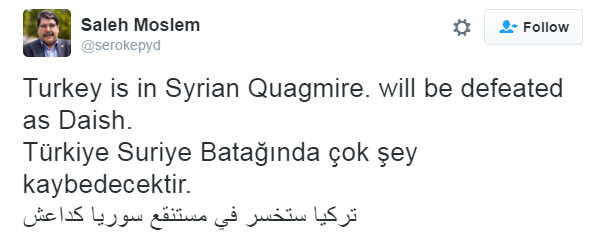
The SDF - which is dominated by the PYD's military wing, the Popular Protection Units (YPG) - drove IS militants out of the strategically important town of Manbij, 30km (20 miles) the south, this month.
Responding to news of the Jarablus offensive, PYD leader Saleh Moslem tweeted that Turkey was now in the "Syrian quagmire" and would be defeated like IS.
Turkey views the PYD as an extension of the Kurdistan Workers Party (PKK), a Turkish Kurdish rebel group fighting for autonomy since the 1980s.
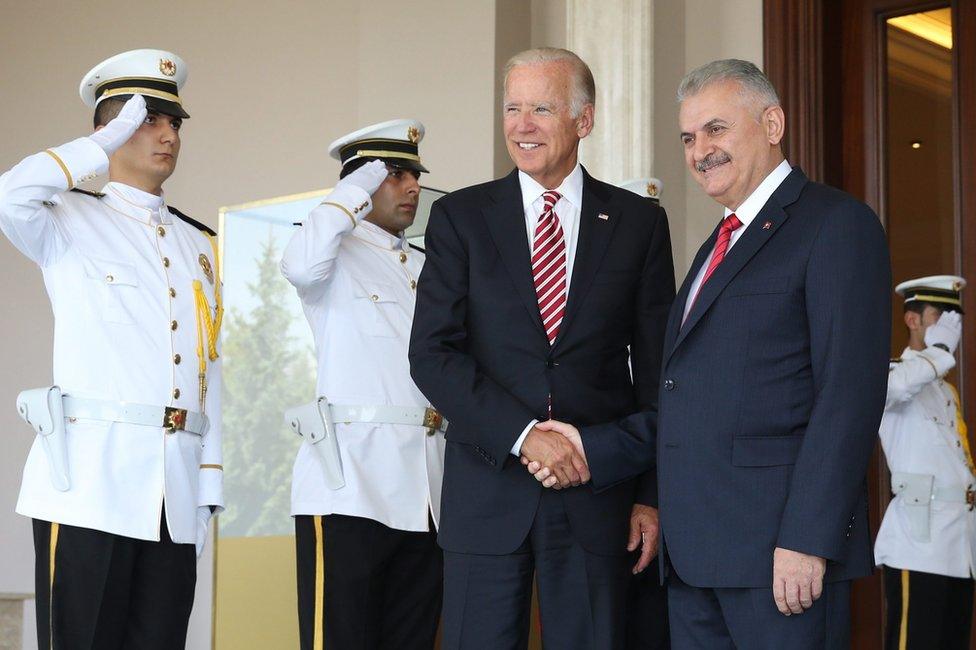
Mr Biden (centre right) met Turkish Prime Minister Binali Yildirim in Ankara
In a separate development on Wednesday, President Erdogan said he would press Vice-President Biden for the extradition of US-based cleric Fethullah Gulen, whom he blames for the recent coup attempt.
At a joint news conference with Turkish Prime Minister Binali Yildirim, Mr Biden said of Mr Gulen: "We have no interest whatsoever in protecting anyone who has done harm but we need to meet the minimum legal standard of our law."
- Published20 August 2016
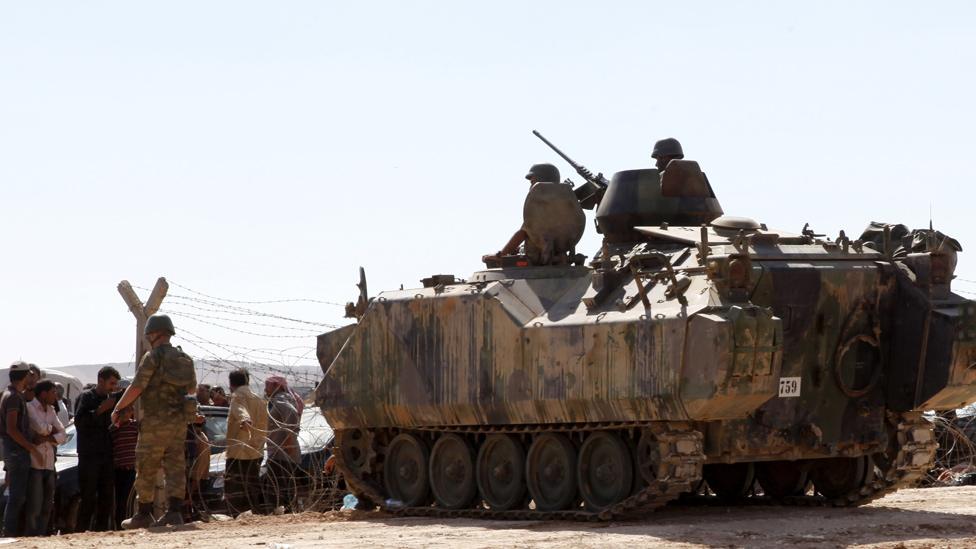
- Published23 August 2016
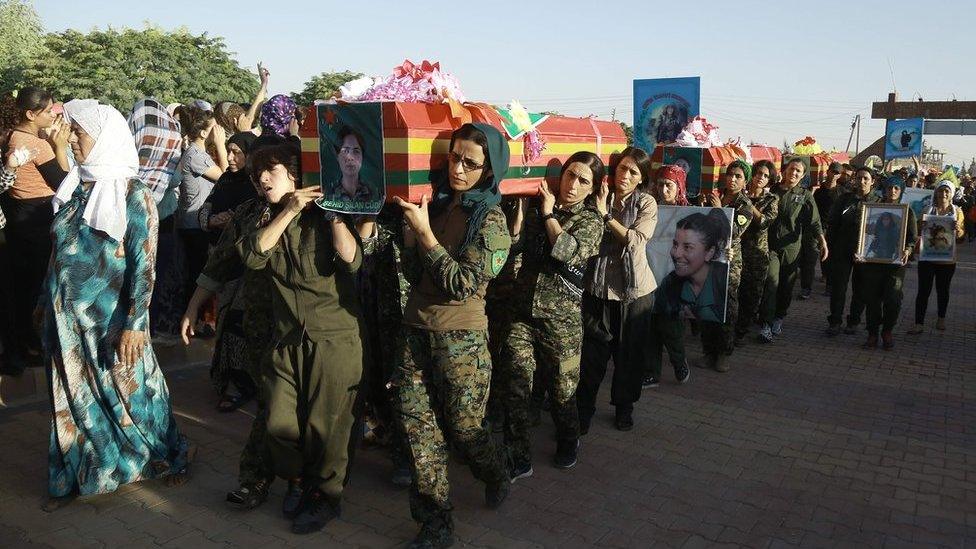
- Published22 August 2016
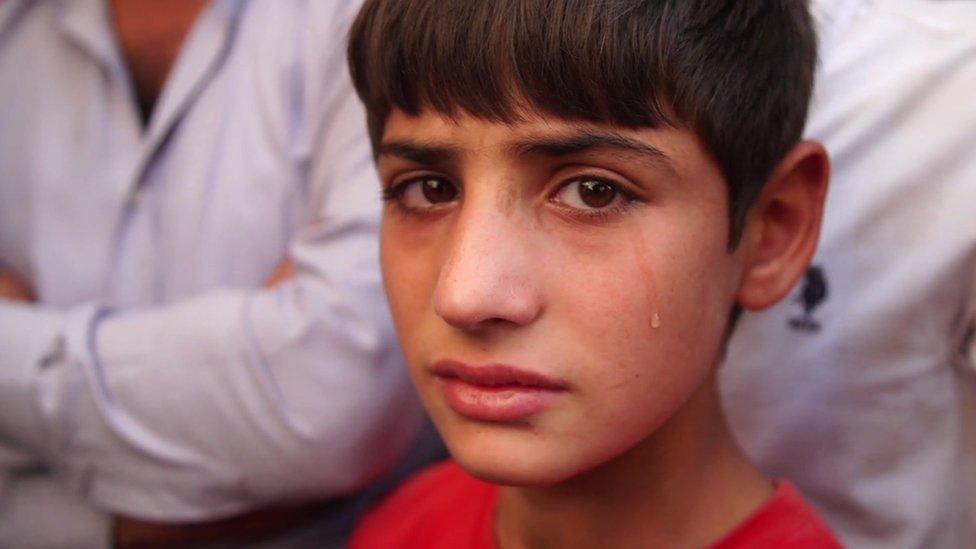
- Published5 January 2017
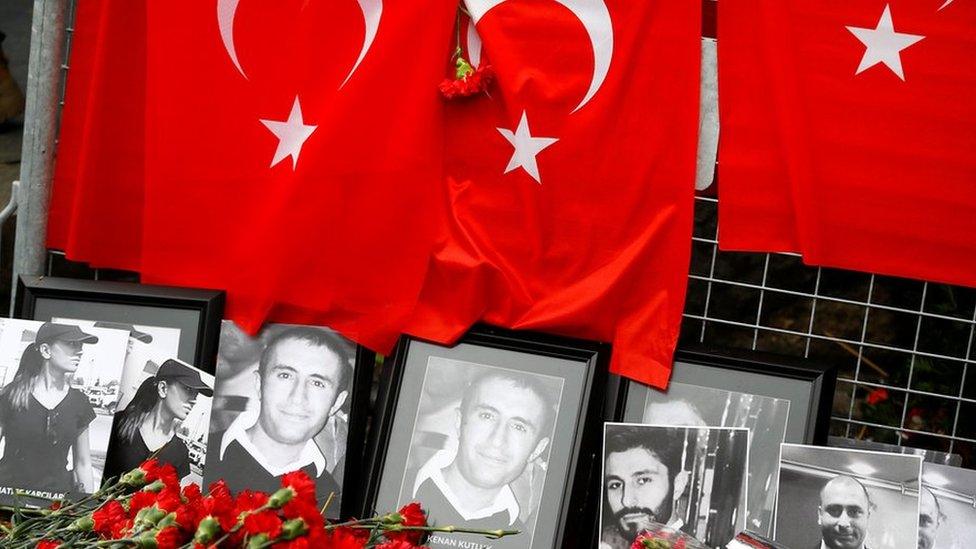
- Published14 March 2016
